Berkeleyan
 |
'Keeping an open mind is hard work' (and other wisdom from the podium)
![]()
31 May 2006
Good graduation pictures, in capturing joy and a sense of accomplishment, resemble one another strongly. Good graduation speeches, if carefully written, strike their own singular chords. Here, examples of both, from the Berkeley commencement season just concluded.
Department of History
David Kennedy, professor of history, Stanford University
When I was about your age, approaching graduation from Stanford, I decided it was time to venture off campus and have a look around. I discovered something that I want to share with you before it's too late: college was the easy part. Now it gets hard. I know college has seemed hard - all those papers, tedious lectures, course assistants speaking an incomprehensible language, exams, labs, problem sets. But three things have made it easy: freedom, forgiveness, and indulgence. All three are about to disappear from your lives forever.
 |
As for the forgiveness part: Well, outside the bosom of your family, you will probably never again be in such a forgiving environment as the one that has nurtured and coddled you here at Berkeley..But out there in the cold, cruel world - well, suffice it to say that it's a jungle out there. Oversleep and lose your job. Show up with a hangover and somebody will eat your lunch before lunchtime. Turn in the wrong results and get sued. And just try to see a doctor..
And as for indulgence: let me tell you something. For four years your professors and course assistants have been paid to read your papers, answer your questions, and listen to your comments. No one will ever be obligated to do that again. If your writing isn't clear, original, and compelling, nobody will read it. If your comments aren't trenchant and factual, nobody will listen. Out there in that seething, competitive, predatory Berkeley outback called the real world, nobody cares, nobody listens, nobody notices - unless you're good, really good . . . and deliver the goods, on time, in order, and with no excuses.
So: I figured all this out some 40 years ago, came back from that expedition off campus, and never left those precincts again. I know I'm sharing this with you at the 11th hour of your own college careers, and I apologize for not getting in touch with you sooner.
Department of Philosophy
Eric Kaplan, television writer/producer
What I'd like to do with these few minutes of your time is describe a world in which a Berkeley philosophy degree is desperately, necessarily, relevant. A world where your training here is urgently important. Where people come begging desperately for philosophy the way they crowd around you if you've found a cure for breast cancer or HIV . or invented an all-chocolate-cake diet.
I'm not going to tell you that having studied philosophy makes me a better comedy writer. (Though it probably has.) But I believe it's made me a better person, that it's helped me to understand myself, the people I love, even the friends and family who were so bemused that I spent those years studying philosophy in the first place.
There are lots of ways to get a job. But there are very few ways to really connect with the world around you, to deepen your knowledge of life, and death, and love, and what it means for us to be here in the first place. And if you come to look at it that way - as I have; if you look at your time here not as some abstract meandering, but as a rare and precious journey toward all of our true selves - well, then, you start to realize that the world in which philosophy urgently matters is this one.
School of Public Health
Laurie Garrett, journalist, senior fellow for global health, Council on Foreign Relations
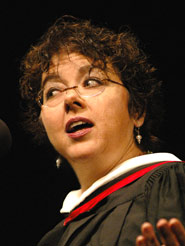 Laurie Garrett |
The world is a dangerous place to work, maybe more so now if you carry an American passport. Humanitarian-aid workers have been targeted for bombings and assassinations all over the world in recent years. This had never happened before. American expertise, once admired and revered, is increasingly viewed with suspicion in an anti-American world. In Nigeria three years ago, a trio of imams in the north told the people of the Moslem world that America put HIV in the polio vaccines to kill Islam. And bingo, the nearly eradicated scourge of polio swept over Nigeria, Niger, and at least 16 Islamic countries as far-flung as Indonesia. So great is the anger toward our country right now that millions of people the world over believe that America wants, as a matter of deliberate foreign policy, to poison and slowly torture their children in the name of public health.
Department of Geography
Allan Pred, professor of geography
A truly democratic politics requires the informed consent of its citizens. If politicians act without the consent of a knowledgeable citizenry, democracy is but an empty term. If politicians act with the consent of an uninformed citizenry, democracy is without substance. If politicians act with the consent of a citizenry that has been deliberately misinformed, that has been led astray by strategically deployed silences, by words of mass deception and words of mass distraction, by the propagation of collective amnesia, and the daily repetition of phrases and messages that are meant to produce fear, then democracy is little short of a gross sham.
So, how well are you prepared to contribute to the functioning of a genuinely democratic politics? How is your geography? What do you know? And in what ways, if any, are you prepared to put your knowledge to work?
Do you know where Bagram is? And what goes on there? ...Do you know where Smithfield, North Carolina, is? Or what goes on there?...Do you know where the site of the Office of Special Plans is? And what goes on there?...Do you know where Natanz is?...Do you know the names of the 14 locations in Iraq where permanent U.S. military bases are either under construction or being planned for?...Do you know the site of the Northern Command for National Defense? Or what its purpose is?...Do you know where in the U.S. detention camps are being built by Kellogg Brown & Root, a Halliburton subsidiary, with a $385 million grant awarded by the Army Corps of Engineers in January?
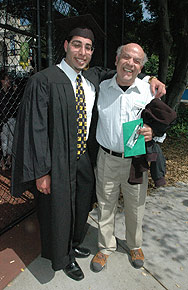 |
[In 1940], a German Jew in exile, the brilliant cultural critic Walter Benjamin, in the process of fleeing his now beloved Paris, made the following aphoristic observation in contemplation of the concept of history: "Marx says that revolutions are the locomotive of history. But perhaps it is quite otherwise. Perhaps revolutions are an attempt by the passengers on this train - namely, the human race - to activate the emergency brake."...If revolution is perhaps too strong a term for the collective action that this present moment of danger calls for, there can be little doubt that the war clock is once again ticking down, that a multiply motivated and ignorance-spawned nuclear assault on Iran is impending . and that there is an urgent need for an informed citizenry that can put democracy to work, [and] that is capable of finding ways to activate the emergency brake.
Department of Earth and Planetary Science
Mark Richards, professor of geophysics and dean of physical sciences, College of Letters and Science
There has never been a time that I can remember when the public appreciation of what science is, and what it is not, has been more important. And we need you to be among the messengers. There are many theories running around in our world - religious, political, philosophical, and scientific. Scientific theories are ones that are testable, or falsifiable, by reproducible means, and they represent an Enlightenment tradition that is very much a part of the whole legacy of public higher education. This is why public schools and universities do not present essentially religious theories, such as creationism or intelligent design, on an equal footing with scientific theories, such as the big bang, plate tectonics, or the theory of natural selection. Scientific theories must ultimately be judged by whether they are in conflict with, or agree with, experimental data or observations, not merely ideas or beliefs. It is primarily for this reason that science has proven a strong antidote to demagoguery and intolerance.
Department of Psychology
Stephen Hinshaw, professor of psychology
I asked you earlier . to thank everyone here who supported you all these years. But think also of some who may not have made it here - those family members who too often don't get discussed, and those about whom you may carry a heavy heart. Perhaps it's the grandparent who lost his or her life to suicide or alcohol. Or the aunt or uncle, niece or nephew or cousin, whose depression, or 'breakdown,' made it difficult for them to go to family functions, or keep the jobs they once had. Or the children of the newest generation who are locked into the world of autism, or who can't seem to regulate their behaviors and emotions no matter how hard they try, or whose learning problems or mental retardation stand in the way of succeeding in school. Or those of any age whose anxieties are crippling, preventing them from venturing out to face the world - or, more dramatically, those who seem to have lost the thread of reason, and who find themselves periodically in mental hospitals, or board-and-care homes, or even on the street. And there are those many family members, often of advancing years, whose minds or whose emotional control have been eroding because of neurological disease or injury.
So I dedicate this talk to all of your family members who cope with mental and neurological illnesses..We must, as a society and world, talk about our relatives, and ourselves, so that the problem does not remain buried. If mental illness stays silent, all is truly lost.
Department of Ethnic Studies
Barbara Reyes, poet
What I'm hoping we will ask ourselves as progressive and learned individuals who comprise our diverse communities is this: How do we go about sincerely supporting one another, recognizing the value and importance of one another's work, given that we necessarily do so in various sectors of community. All too often we hear "elitist" and "whitewashed" directed at those who grew up in suburban, middle-class privilege. Those who speak and write in theoretical and academic language within prestigious ivory towers - for example, this one. Whose art is embraced by avant-garde circles or recognized by mainstream institutions..We hear "white" directed with derision at those within our movements who are light-skinned folks of color, who are mixed race - Hapa, Mestizo. We oftentimes sweepingly exclude white people from our movements. We hear "sellout" directed at those who enter the corporate world, we hear "manhater" directed at women who are fierce in their feminist beliefs and practices. We witness much hateful homophobic and heterosexist behavior. We witness paternalism and condescension directed at younger generations. We witness petty jealousies directed at those whose hard work has gained some amount of public acclaim.
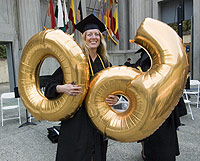 |
This behavior is rather unbecoming of those working for social justice, for civil and human rights..Where does the word "ally" fit here? And does it even apply when it appears we inhabit separate camps divided by class, by gender, by generation; when we are so divided by ideology and strategy? Whether we teach in inner cities or suburbs or rural areas, in primary or secondary education, in prestigious universities, community colleges, or vocational schools. Whether we organize labor unions [or] conduct cultural-sensitivity trainings in corporate settings....Whether we tag graffiti, depict our heroes or history in murals, or paint abstract expressionism. It appears we have a lot of work to do among ourselves before we can aspire to fix what's wrong with this country and its racist institutions.
Department of Theater, Dance, and Performance Studies
Tony Taccone, artistic director, Berkeley Repertory Theater
For artists, those intrepid souls who have chosen to pursue a life led by their creative instincts, the prospect of leaving the protective atmosphere of school and joining the army of wage slaves can be daunting. After all, this is not a culture that encourages the wanderings and meanderings of the poetic soul. This is not a culture that rewards time spent trundling through one's unconscious in pursuit of the perfect image, the perfect choreographic movement, or the perfect end to a new play. Simply put, this is not a culture that encourages art as an activity, never mind a profession. Moreover, there is an extended mythology of the artist as immature, someone unwilling to live in the "real world," someone who is shirking their responsibility as a hard-working citizen of this fair nation.
So why do it? Why make yourself vulnerable to the vicissitudes of the marketplace, the judgement of those who do not take art seriously, and the specter of rejection. Why? Because there is no higher calling than that of an artist. There is no richer way of life than one spent pursuing the creative truth, no greater responsibility than holding a mirror up to society, no greater challenge or mystery than marrying our dream life to our waking life.
School of Journalism
James Nachtwey, photojournalist
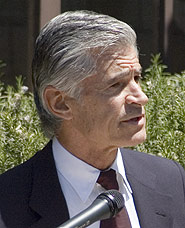 James Nachtwey |
Perhaps history moves not in a straight line but in a spiral. On Sept 11, 2001, the process derailed. The past and the future collided, and the explosion ripped open the door into a new era. Immediately following the attack, photographs and video became a confirmation of reality, about an event that seemed beyond belief. They also became a focal point for anger, for grief, for the determination to recover and to prevail. Press images became a real-time national theater in which America's agony and its resolve were being played out. Photojournalism - which for many years had been in decline, in favor of pictures of celebrities, fashion, and lifestyle - became transcendent. Photographs were no longer records of history; they became living history. America had been jolted out of its sense of isolation. Its relationship to the world was redefined, and suddenly there was recognition of the importance of understanding the rest of the world and of the role of documentary photography in creating that understanding.
We're now almost five years down the line, and we have to ask ourselves if we've remained true to that mission or if we've slid backward toward escapism and isolation. If we've allowed marketing decisions to co-opt journalistic responsibility - and if so, what might be the consequences for our society and for the world. Every story does not have to sell something. There is also a time to give. People will care, if journalists give them something to care about..
Department of English
Rebecca Solnit, art critic, writer
When I think of the state of the world I think of those Dickens novels in which so many characters are onstage that there is no single conclusion. Think of Great Expectations, in many ways the most purely tragic of his novels, with Pip and Estella forever separated and forever saddened by the hard lessons they have learned. (At least in the unsweetened original ending.) Tragedy, my splendid undergraduate English professor told me, ends in exile, comedy in marriage. But remember that Dickens in all his multifarious generosity gave us many stories in one book. After all, in Great Expectations, Biddie and Joe seemed to be living as happily ever after as Pip's great friend Herbert and his dear girl. Great Expectations is a tragedy, but only for the major figures, and perhaps these millennial years are a tragedy for the United States and a few other giant countries like Russia, while Bolivia and Chile, for example, bloom. For others and elsewhere it has been an era of miracles, if not of paradises.
College of Chemistry
Steven Chu, director, Lawrence Berkeley National Laboratory
Here are a few principles I learned from my thesis adviser and from other pioneering scientists. I also try to pass this way of doing science to my students and postdocs.
In trying to understand something, the first pass should be to try to understand the "essence" of the problem or solution.
The details are also important. You need the ability to zoom in at any level of detail when needed.
Train yourself to differentiate incremental advances from something that is really new. Most of what is published is incremental.
Re-frame the problem or discovery in your own language and in as many different languages as possible. Understanding something in your gut is a needed step to developing intuition. Intuition is essential for making intellectual leaps.
Know when you are making intellectual leaps. An essential part of creativity is to figure out how to convert an intuitive leap into something with legs.
Be comfortable with uncertainty and ambiguity. The more complicated the phenomena or problem, the more tempting it is to interpret data in terms of a favorite model. Try to keep as many interpretations in your head as possible. Keeping an open mind is hard work.
African American Studies
Byron Williams, writer, theologian, activist
The civil rights movement didn't just improve things for black folks; that movement made America better. That's what you're rejoicing in; that's the legacy you're building on.
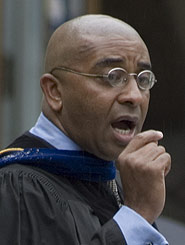 Byron Williams |
But having a degree does not give you that. The University of California did not give you that. You brought that to the University of California! Because the word "education" comes from a Latin word that simply means to bring out what is already there. Education does not confer value; it recognizes and affirms the value that's already there. It is the value that the Middle Passage could not devour. It is the value that Plessy v. Ferguson could not obliterate. It is the value that lynchings and poll taxes and sharecropping and single-parent homes could not distort, because the value was already there.
I know it's easy to feel like checking out sometimes. But you've got to stay engaged. You've got to confront reality. Sometimes, Class of 2006, you gotta deal with some absurdity and nonsense..By staying engaged you also understand and accept the challenge that you stand on the shoulders of many who went before you, and because of the way they bore the heat of the noonday sun of injustice, your darkest today is a lot brighter than their brightest yesterday.
Photos by Steve McConnell, Bonnie Azab Powell, Peg Skorpinski, and Deborah Stalford


